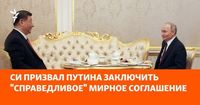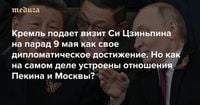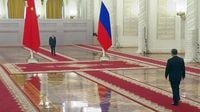In a show of solidarity, Russian President Vladimir Putin and Chinese President Xi Jinping held an official meeting in the Kremlin on May 8, 2025, ahead of the 80th anniversary of Victory Day celebrations. This meeting, marked by expressions of friendship and mutual respect, highlighted the deepening ties between Russia and China amidst a backdrop of geopolitical tensions.
Putin warmly thanked Xi for agreeing to share in the celebration of this significant anniversary, referring to him as a "dear friend." He emphasized the historic bond formed during World War II, stating, "The combat brotherhood of our peoples, forged in those harsh military years, is one of the fundamental foundations of modern Russian-Chinese relations, encompassing partnership and strategic interaction." This sentiment reflects a shared narrative that both countries have cultivated over the years.
During the meeting, Putin underscored the immense sacrifices made by both nations during the war, noting that the Soviet Union lost 27 million lives while China lost 37 million in their fight for freedom and independence. He attributed this victory to the leadership of the Communist Party of China, reinforcing the ideological ties that bind the two nations.
Xi Jinping, who arrived in Moscow on May 7, 2025, for a four-day official visit, participated in discussions with Putin on various topics, including the ongoing "Ukrainian crisis." His presence at the Victory Parade on May 9 is being portrayed by the Kremlin as a diplomatic triumph, especially in light of other world leaders' refusals to attend the celebrations. Analysts suggest that this visit symbolizes a failure of the Trump administration's attempts to create a rift between China and Russia.
As Xi and Putin stood side by side during the parade, the event served as a powerful visual representation of their alliance. Xi referred to the ties between the two countries as "unbreakable," asserting that Russia and China should be "friends of steel." However, experts caution that beneath this surface-level camaraderie lies a complex relationship characterized by both cooperation and competition.
Matthew Bulig from the Center for European Policy Analysis noted, "They can be allies in one area, but in another, they may compete or even harm each other. There is a lot of symbolism in their relationship, but it’s important to look at its real essence." Indeed, while Russia is a crucial partner for China, the ramifications of Putin's invasion of Ukraine have made Russia somewhat of an international pariah, complicating Beijing's diplomatic positioning.
As China navigates its relationship with Russia, it is also seeking to improve ties with Europe, particularly after the election of Donald Trump as U.S. President. Xi's government has been engaging with European leaders, including messages exchanged with Ursula von der Leyen and Charles Michel regarding the 50th anniversary of bilateral relations. However, Beijing must tread carefully, as overt closeness to Moscow could alienate potential European partners.
In a related development, Xi expressed hope for a "fair and lasting" peace agreement concerning Ukraine during his discussions with Putin. He emphasized the need for a dialogue-based resolution that could be accepted by all parties involved. This statement aligns with previous comments made by Chinese Foreign Minister Wang Yi, who also advocated for a peace agreement that would be binding and acceptable to all.
Despite China's attempts to position itself as a neutral broker, its ongoing support for Russia amid international sanctions complicates its global image. Xi’s remarks echo U.S. President Trump's suggestion that it would be "natural" for China to assist in brokering a deal between Ukraine and Russia, although a 12-point peace plan proposed by Beijing in February 2023 was rejected by Kyiv's allies.
As the geopolitical landscape evolves, the relationship between Russia and China appears increasingly asymmetrical. While both nations share common interests in countering U.S. hegemony, analysts warn that the balance of power is tipping in favor of China. Russia's growing dependence on China for economic survival, exacerbated by Western sanctions, has led to concerns about its diminishing geopolitical influence.
China's economic ties with Russia are becoming more pronounced, with mineral resources accounting for nearly 80% of Russian exports to China. However, Chinese direct investments in Russia remain low, indicating a one-sided economic relationship that benefits China more than Russia. This dependency raises questions about the long-term sustainability of their partnership, as Russia may find itself increasingly compelled to make concessions to Beijing.
In Central Asia and the Caucasus, Russia faces the challenge of China's expanding influence, as local elites seek to hedge their geopolitical risks by aligning with Beijing. While Russia still maintains a strong position in the region, its imperial ambitions are being challenged by China's growing economic presence.
Furthermore, the military dynamics between the two nations are also shifting. Although Russia has historically been a major supplier of arms to China, the latter is now advancing its own defense capabilities, leading to tensions over technology transfer and military cooperation. As China enhances its military exports, Russia's share of the global arms market has diminished significantly.
In the Arctic, where Russia asserts its sovereignty, China promotes a vision of shared access, complicating Moscow's ambitions. This divergence in interests could lead to future conflicts as both nations navigate their respective goals in this strategically important region.
As the world watches the evolving relationship between Russia and China, it becomes clear that while they may present a united front against Western pressures, the underlying dynamics reflect a complex interplay of cooperation and competition. The future of their alliance will depend on how both nations manage their respective ambitions and the external challenges they face.



